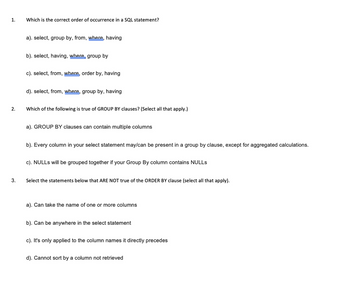1. 2. 3. Which is the correct order of occurrence in a SQL statement? a). select, group by, from, where, having b). select, having, where group by c). select, from, where, order by, having d). select, from, where, group by, having Which of the following is true of GROUP BY clauses? (Select all that apply.) a). GROUP BY clauses can contain multiple columns b). Every column in your select statement may/can be present in a group by clause, except for aggregated calculations. c). NULLS will be grouped together if your Group By column contains NULLS Select the statements below that ARE NOT true of the ORDER BY clause (select all that apply). a). Can take the name of one or more columns b). Can be anywhere in the select statement c). It's only applied to the column names it directly precedes d). Cannot sort by a column not retrieved
1. 2. 3. Which is the correct order of occurrence in a SQL statement? a). select, group by, from, where, having b). select, having, where group by c). select, from, where, order by, having d). select, from, where, group by, having Which of the following is true of GROUP BY clauses? (Select all that apply.) a). GROUP BY clauses can contain multiple columns b). Every column in your select statement may/can be present in a group by clause, except for aggregated calculations. c). NULLS will be grouped together if your Group By column contains NULLS Select the statements below that ARE NOT true of the ORDER BY clause (select all that apply). a). Can take the name of one or more columns b). Can be anywhere in the select statement c). It's only applied to the column names it directly precedes d). Cannot sort by a column not retrieved
Database System Concepts
7th Edition
ISBN:9780078022159
Author:Abraham Silberschatz Professor, Henry F. Korth, S. Sudarshan
Publisher:Abraham Silberschatz Professor, Henry F. Korth, S. Sudarshan
Chapter1: Introduction
Section: Chapter Questions
Problem 1PE
Related questions
Question

Transcribed Image Text:1.
2.
3.
Which is the correct order of occurrence in a SQL statement?
a). select, group by, from, where, having
b). select, having, where group by
c). select, from, where, order by, having
d). select, from, where, group by, having
Which of the following is true of GROUP BY clauses? (Select all that apply.)
a). GROUP BY clauses can contain multiple columns
b). Every column in your select statement may/can be present in a group by clause, except for aggregated calculations.
c). NULLS will be grouped together if your Group By column contains NULLS
Select the statements below that ARE NOT true of the ORDER BY clause (select all that apply).
a). Can take the name of one or more columns
b). Can be anywhere in the select statement
c). It's only applied to the column names it directly precedes
d). Cannot sort by a column not retrieved
Expert Solution
This question has been solved!
Explore an expertly crafted, step-by-step solution for a thorough understanding of key concepts.
This is a popular solution!
Trending now
This is a popular solution!
Step by step
Solved in 3 steps

Follow-up Questions
Read through expert solutions to related follow-up questions below.
Follow-up Question
Please answer 2 and 3

Transcribed Image Text:1.
2.
3.
Which is the correct order of occurrence in a SQL statement?
a). select, group by, from, where, having
b). select, having, where group by
c). select, from, where, order by, having
d). select, from, where, group by, having
Which of the following is true of GROUP BY clauses? (Select all that apply.)
a). GROUP BY clauses can contain multiple columns
b). Every column in your select statement may/can be present in a group by clause, except for aggregated calculations.
c). NULLS will be grouped together if your Group By column contains NULLS
Select the statements below that ARE NOT true of the ORDER BY clause (select all that apply).
a). Can take the name of one or more columns
b). Can be anywhere in the select statement
c). It's only applied to the column names it directly precedes
d). Cannot sort by a column not retrieved
Solution
Knowledge Booster
Learn more about
Need a deep-dive on the concept behind this application? Look no further. Learn more about this topic, computer-science and related others by exploring similar questions and additional content below.Recommended textbooks for you

Database System Concepts
Computer Science
ISBN:
9780078022159
Author:
Abraham Silberschatz Professor, Henry F. Korth, S. Sudarshan
Publisher:
McGraw-Hill Education

Starting Out with Python (4th Edition)
Computer Science
ISBN:
9780134444321
Author:
Tony Gaddis
Publisher:
PEARSON

Digital Fundamentals (11th Edition)
Computer Science
ISBN:
9780132737968
Author:
Thomas L. Floyd
Publisher:
PEARSON

Database System Concepts
Computer Science
ISBN:
9780078022159
Author:
Abraham Silberschatz Professor, Henry F. Korth, S. Sudarshan
Publisher:
McGraw-Hill Education

Starting Out with Python (4th Edition)
Computer Science
ISBN:
9780134444321
Author:
Tony Gaddis
Publisher:
PEARSON

Digital Fundamentals (11th Edition)
Computer Science
ISBN:
9780132737968
Author:
Thomas L. Floyd
Publisher:
PEARSON

C How to Program (8th Edition)
Computer Science
ISBN:
9780133976892
Author:
Paul J. Deitel, Harvey Deitel
Publisher:
PEARSON

Database Systems: Design, Implementation, & Manag…
Computer Science
ISBN:
9781337627900
Author:
Carlos Coronel, Steven Morris
Publisher:
Cengage Learning

Programmable Logic Controllers
Computer Science
ISBN:
9780073373843
Author:
Frank D. Petruzella
Publisher:
McGraw-Hill Education